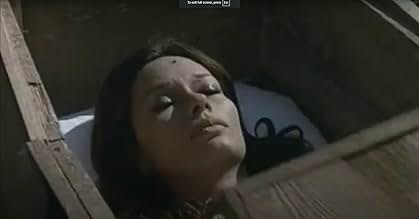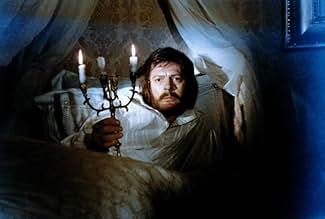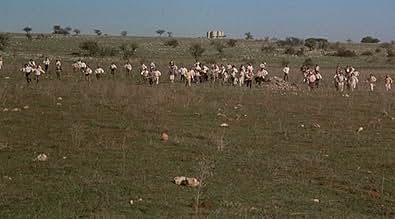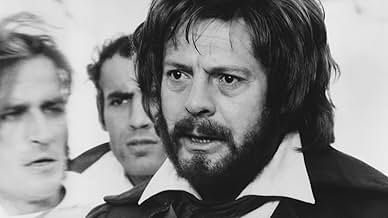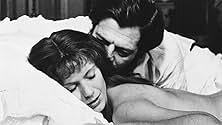VALUTAZIONE IMDb
7,0/10
1386
LA TUA VALUTAZIONE
Aggiungi una trama nella tua linguaA anarchist leader (Fulvio) wishes to retire, as he is old and tired. He tries to hide himself, but his friends find him and insist he carries on helping them.A anarchist leader (Fulvio) wishes to retire, as he is old and tired. He tries to hide himself, but his friends find him and insist he carries on helping them.A anarchist leader (Fulvio) wishes to retire, as he is old and tired. He tries to hide himself, but his friends find him and insist he carries on helping them.
- Regia
- Sceneggiatura
- Star
- Premi
- 3 candidature totali
Recensioni in evidenza
Of course you have to like the Taviani brothers style, something rather hard for viewers contaminated with the fast moving, predictable (even when trying hard to be unpredictable) plots of Hollywood McDonalds-style commercial movies. Taviani brothers take a bitter look at Italy of the '70's, the time when several leftist revolutionary groups, like the Brigade Rosse, the Autonomia Operaia and the Lotta Continua, chose the path of armed struggle against Italian capitalism, ending in a horrible massacre of politicians, judges, and innocent people. Just like them Fulvio, is of a wealthy, aristocratic origin and his revolutionary stance is just sentimental, not backed by real-life status. He gets easily disillusioned, but, caught in a moving sand, however he struggles to reclaim his past life he gets trapped and is swallowed in the end. It is hard to watch a film that you cannot identify with anyone, but it is worth a try.
It is my first encounter with Taviani brothers' work, my instant gut-feeling is that this surrealistic political-drama about a traitor's ill-fated fallout is perhaps blemished by the incompatibility of our generation, I reluctantly pigeonhole it to those films inevitably go astray from their glorious road along the unstoppable torrent of time!
Marcello Mastroianni this time around employs a substantially anti-hero persona opponent to his more audience-friendly role as the marquee Italian dream-lover. An abnormally bitter repugnance exudes from his character brims with all the screen time and I can sense a tint of misogyny levitating in the air with an inexplicably compelling thespian vibe. The lesser characters are all one-dimensional notwithstanding, a feral Lea Massari (from THE ADVENTURE) still could draw some attention for her very underdeveloped role.
All the sectors are somehow quirky enough to create certain discontinuity in the narrative, which could be a deliberate novelty at that time, but fails to leave sympathetic impression throughout, plus without the adequate stewing time, I might wonder it might be too hasty for audience to ruminate or even reflect the actual happening in the film, especially for a foreigner.
Marcello Mastroianni this time around employs a substantially anti-hero persona opponent to his more audience-friendly role as the marquee Italian dream-lover. An abnormally bitter repugnance exudes from his character brims with all the screen time and I can sense a tint of misogyny levitating in the air with an inexplicably compelling thespian vibe. The lesser characters are all one-dimensional notwithstanding, a feral Lea Massari (from THE ADVENTURE) still could draw some attention for her very underdeveloped role.
All the sectors are somehow quirky enough to create certain discontinuity in the narrative, which could be a deliberate novelty at that time, but fails to leave sympathetic impression throughout, plus without the adequate stewing time, I might wonder it might be too hasty for audience to ruminate or even reflect the actual happening in the film, especially for a foreigner.
The political prisoner Fulvio Imbriani (Marcello Mastroianni) is released ill from prison and the authorities expect to find his rebel friends though him. However, he returns to his family's real state and recovers his health with his siblings. When his lover Charlotte (Lea Massari) unexpectedly arrives in the property, she stays with Fulvio but his sister overhears Charlotte telling that their friends would be arriving on the next morning and calls the authorities. The soldiers kill a great number of revolutionaries but Fulvio escapes with Charlotte that was shot on the back. She dies and Fulvio travels with his comrades but without enthusiasm. Sooner he betrays the group, trying to flee to United States with the money of the revolutionaries and his new lover Francesca (Mimsy Farmer).
"Allonsanfàn" is boring story with a messy lead character and a terrible screenplay that is awfully developed. It is never clear where and when the story takes place; the characters come and go without any explanation or previous development – the viewer never knows who they are or their relationship; Fulvio's motives are confused and never clear, and it is never clear why this amoral bourgeois is a leader of the revolutionaries (or bandits?). There is one ridiculous scene with a frog where the directors are probably trying to give the status of cult to this overrated movie. My vote is four.
Title (Brazil): "Allonsanfan"
"Allonsanfàn" is boring story with a messy lead character and a terrible screenplay that is awfully developed. It is never clear where and when the story takes place; the characters come and go without any explanation or previous development – the viewer never knows who they are or their relationship; Fulvio's motives are confused and never clear, and it is never clear why this amoral bourgeois is a leader of the revolutionaries (or bandits?). There is one ridiculous scene with a frog where the directors are probably trying to give the status of cult to this overrated movie. My vote is four.
Title (Brazil): "Allonsanfan"
Allonsanfan is one of those rare foreign language films about which dedicated viewers know a lot without having gotten a chance to see it. It is rather unfortunate that this classic film directed by Taviani brothers has neither been shown repeatedly on TV screens around the world nor its DVD is as easily available as that of "Braveheart".If we look closely at the productivity of Italian cinema,we will come to know that there is only an Italian film ("La nuit de Varennes" directed by Ettore Scola) which similar to it in terms of style and content.Allonsanfan is quite similar to a Hungarian auteur Miklos Jancso's film but with no nudity,no brutality and no humiliation.At the core of this film is a detailed description of the tough life of a determined revolutionary.Sometimes he is trusted by his followers, sometimes he is not.Family ties are of great importance for him as any other aristocrat.The only unusual aspect of his behavior is that he does not know how to maintain them.Betrayal is a repetitive element of this film as there are plenty of disloyal souls linked to our strongman.This is the reason why he fails to remain neither a true revolutionary nor a true aristocrat.The portrayal of incest is rather out of place for this film.It loses its credibility because of prevalence of dramatic situations.It is true that "Allonsanfan" is visually exquisite but it is somewhat difficult to follow the film's flow as not much of historical context is provided to the viewer.One can say that events happen of their own accord.It is only after reaching the halfway mark that viewers comprehend that Allonsanfan is one of the this film's important protagonists.A positive thing about it is its star cast with remarkable performances by Marcello Mastroianni.A must see for all the admirers of auteur cinema especially of Vittorio and Paulo Taviani.
Marcello Mastroianni's story is never simple. He is released from prison in hopes that he would lead authorities to the underground resistance, but instead he finds himself torn between wealthy and a family he once had, and the opportunity to help his brethren save others from the dreaded cholera. It is a tough choice, and in the end Mastroianni (as in previous films) has done a great job of building tension within his character. The moral dilemma he is faced with is a tough one, kill those he was once involved with in essence betray them, or forever be chased by his past sins. He chooses the latter, and uses trickery and trust to break this small group of bandits. "Allonsanfan" can be spliced into three different distinct films, each with amazing imagery, but lacking the development needed to really bring the audience further into the film. The first is with Mastroianni heading home, overcoming sickness, finding his girlfriend, and all the while plotting an ambush. Great scenes, could have been a great moment, but we know nothing about his family or girlfriend outside of what they mutter or what the subtitles give us. We needed to see more of his interaction with these random characters. The second part involves his son, good, but was again cut short and strange because we knew nothing about it outside of the fact that he had a son. I can't even go further into the entire frog scene, I am still trying to wrap my brain around that. The incident on the lake was another example of having a strong cinematographer, but a apathetic storyteller. Finally, there was the scene in the South where we see why this film is entitled "Allonsanfan", but by this point the excitement has died, and we are just waiting for a finale.
This film did involve hard work and dedication by the entire crew to make, with that said; I cannot just fully say that this film was a failure. There were those that worked hard on this project like the cinematographer and the amazing score by Ennio Morricone. These elements alone brought this film out of one that would make any viewer fall asleep into one worth viewing at least once. The story is where most of the trouble laid, and again, I cannot state that it was one of those cases where there were too many ideas and not enough time or conjoining scenes. We would begin a thought, but end elsewhere in the story (again, see the segment with the frog). Perhaps some of it was done to try to bring sympathy to Mastroianni, but it could have been done without the random acts of history or perhaps more history. There was a moment in this film where I thought we could have used more history devoted to the story. That is what was missing from scene to scene. At times our characters were moving without a motive, and history could have interjected to help the audience better see the motives and reasoning. Perhaps it was my lack of knowledge of what Italy was like at the end of Napoleon's era, but more explanation could have been used do develop our bandits, or the motives behind Mastroianni's deeds.
On a small note, if you decide to watch this film on VHS, beware of the subtitles. I am very good at reading subtitles on a foreign film, I hate the sound of dubbed voices, but with "Allonsanfan", the subtitles were all over the place. There were several occasions where they were missing from conversations, where one character would have a three-minute speech and the only word to come up in the subtitle would be "yes", or when half the words were missing from the side of the television. It was troublesome to read and watch at the same time, so to get the full effect of the film, I found myself turning off the sound and reading to the best of my ability. Probably lessoned the film, but kept me in check with the meager characters.
Overall, I cannot say this was a horrible film, but it won't be viewed again by yours truly. I may challenge myself to see it again on DVD if it ever is released, but for now, it needs to tighten up its story and used a bold marker on its characters. Mastroianni was superb in his role, but nobody could keep up with him. They were all overacting, overbearing, boring, or just plain unknown. There were other characters in this film, but if you asked me to name one well, maybe Charlotte, but that is it I don't think I could. The Taviani's had some great ideas, but the execution is where they lacked. There could have been more A to B to C structure with the story, instead it was as if they built three separate stories and hastily glued them together. If you were forced to watch this film, I think you could pull away by just seeing the end and knowing everything you missed. It is a sharp ending, one wishes only that the rest of the film were that way. One viewing, if you dare if not you are not missing anything. There are better Italian films out there.
Whew, this one took me back to when I watched Topol's "Gallileo". Too stagy for my enjoyment.
Grade: ** out of *****
This film did involve hard work and dedication by the entire crew to make, with that said; I cannot just fully say that this film was a failure. There were those that worked hard on this project like the cinematographer and the amazing score by Ennio Morricone. These elements alone brought this film out of one that would make any viewer fall asleep into one worth viewing at least once. The story is where most of the trouble laid, and again, I cannot state that it was one of those cases where there were too many ideas and not enough time or conjoining scenes. We would begin a thought, but end elsewhere in the story (again, see the segment with the frog). Perhaps some of it was done to try to bring sympathy to Mastroianni, but it could have been done without the random acts of history or perhaps more history. There was a moment in this film where I thought we could have used more history devoted to the story. That is what was missing from scene to scene. At times our characters were moving without a motive, and history could have interjected to help the audience better see the motives and reasoning. Perhaps it was my lack of knowledge of what Italy was like at the end of Napoleon's era, but more explanation could have been used do develop our bandits, or the motives behind Mastroianni's deeds.
On a small note, if you decide to watch this film on VHS, beware of the subtitles. I am very good at reading subtitles on a foreign film, I hate the sound of dubbed voices, but with "Allonsanfan", the subtitles were all over the place. There were several occasions where they were missing from conversations, where one character would have a three-minute speech and the only word to come up in the subtitle would be "yes", or when half the words were missing from the side of the television. It was troublesome to read and watch at the same time, so to get the full effect of the film, I found myself turning off the sound and reading to the best of my ability. Probably lessoned the film, but kept me in check with the meager characters.
Overall, I cannot say this was a horrible film, but it won't be viewed again by yours truly. I may challenge myself to see it again on DVD if it ever is released, but for now, it needs to tighten up its story and used a bold marker on its characters. Mastroianni was superb in his role, but nobody could keep up with him. They were all overacting, overbearing, boring, or just plain unknown. There were other characters in this film, but if you asked me to name one well, maybe Charlotte, but that is it I don't think I could. The Taviani's had some great ideas, but the execution is where they lacked. There could have been more A to B to C structure with the story, instead it was as if they built three separate stories and hastily glued them together. If you were forced to watch this film, I think you could pull away by just seeing the end and knowing everything you missed. It is a sharp ending, one wishes only that the rest of the film were that way. One viewing, if you dare if not you are not missing anything. There are better Italian films out there.
Whew, this one took me back to when I watched Topol's "Gallileo". Too stagy for my enjoyment.
Grade: ** out of *****
Lo sapevi?
- QuizTitle derived from the first two words of the French national anthem.
- ConnessioniEdited into Marcello, una vita dolce (2006)
I più visti
Accedi per valutare e creare un elenco di titoli salvati per ottenere consigli personalizzati
- How long is Allonsanfan?Powered by Alexa
Dettagli
- Tempo di esecuzione1 ora 55 minuti
- Mix di suoni
- Proporzioni
- 1.85 : 1
Contribuisci a questa pagina
Suggerisci una modifica o aggiungi i contenuti mancanti

Divario superiore
By what name was Allonsanfàn (1974) officially released in India in English?
Rispondi
